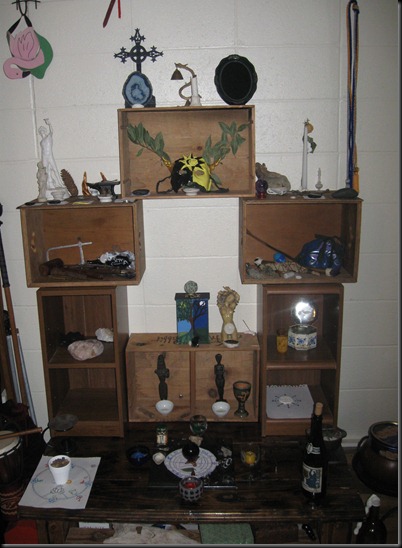I haven’t lived in Indiana for very long. I don’t really have any sacred spaces out here, and while I’m animist/pantheist enough that (in theory) all space is sacred space, the weather lately has sucked so bad that—between the rain, the sleet, and the more rain—going outside just hasn’t been conducive to mediating I any might have wanted to do. So, for practical purposes, the sacred pace I have available to me is my home: the temple I’ve been building and refining since I arrived in August.
The Sunrise Temple has been in good condition ever since I got back from KC: I’ve been cleaning house and cleansing at least once a week. But the altar had gotten cluttered with all the work I was doing in preparation of first driving back to Kansas City, then the work I was doing when I first came back to produce my Learn Greek talismans (the first one when I posted about the, then the second and third [one for my altar, one for my bag] a week later when my backpack ate the first).
Fortunately, I had a Dark Moon to work with this weekend. And I had a lot of work I wanted to do. Saturday night had four things on the slate: trying out Lon Milo DuQuette’s banishing/invocation; cleansing the house; blessing my Dark Moon water; and rebuilding my altar.
Being uncertain how the DuQuette I actually started with the house-cleansing: cleaning up my mess, sweeping the floors (I really want a fancy besom like they sell at the Renaisance Faire), and smudging everything. I really need to do continue doing this no less than once a week. I get scattered when I don’t.
Following that, I did a little preparatory divination. I’ve never done any of DuQuette’s work before, and the ritual blew Aradia’s mind, so it seemed prudent. All the “present” information looked really good, I always love to see a 10S on the way out, and 6S and The Devil seemed like a workable outcome. So I went for it: putting on a random mix of ancient Greek music I stole from the internet and Holst’s Planet Suite, I was ready to get started.
All the “present” information looked really good, I always love to see a 10S on the way out, and 6S and The Devil seemed like a workable outcome. So I went for it: putting on a random mix of ancient Greek music I stole from the internet and Holst’s Planet Suite, I was ready to get started.
For those who haven’t read DuQuette’s Low Magick, it’s an Inner Working (visualization exercise) and Aradia sums it up pretty well. But neither Ganesha nor Kwan Yin are quite my style. After a week or so of contemplation since finishing the book, I came to the conclusion that Ἔρος was the god for me. And boyhowdy, was s/he.
I disn’t get the sort of transcendental brain-borking Aradia did, but damn did I get high. Just as I was finishing, the music switched from soft, soothing, and ancient to Holst’s Jupiter: the Bringer of Jollity, and I was ready to work.
Behold, my beautiful new altar:
Taller, cleaner, with room for more idols,and with places to store my active projects—particularly the collection of seals and tokens representing the friends who’ve graciously allowed me to include them in my ascendancy/prosperity work. I’m still in the process of fine-tuning the arrangement, of course, but I’m very pleased so far.
I finished everything up by feeding my gods and allies, and preparing my house-wards for the following evenings bigger, better, and potentially explosive experiment.
Next up: Dark Moon 2/3: the Stele of Jeu.
